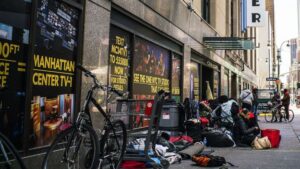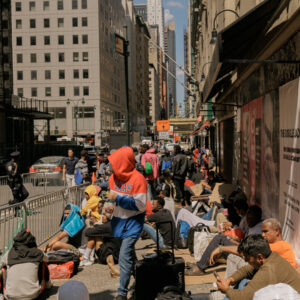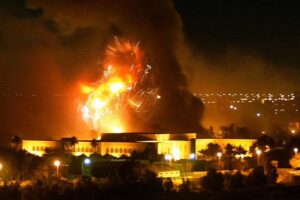
NYC Subway Map (NYC Subway Guide)

Homeless individuals outside a New York theater (ABC News)

Migrants camped out on the streets of New York City (New York Times)

Bomb raid by the United States during the Iraq War in Baghdad (The Independent UK)
As someone who was born and raised in New York City, I believe two groups primarily stand out as plural “others”: for most of my life, New York’s homeless population, and more recently, the migrant population. As a child, I would hear about the homeless population as a monolith. When interacting with them, it was to give them a dollar or two from my parents and then continue walking. There was one man who lived near my house, who knew my mother for numerous years, and whom we would say hi to when passing. Beyond him, however, they were a group who were concretely involved in my life, as I saw them every day, but whom I knew nothing about. When I heard about them on the news, it was always people addressing “New York’s ginormous homeless problem” or my fellow New Yorkers saying that homeless individuals should just get a job like the rest of us. This attitude and creation of a plural other feeds into perceptions, especially concerning associating the actions of specific individuals with a whole group. A somewhat uniquely New York problem is that of violence on public transportation; I personally have had my fair share of disturbing encounters on the subway, many of which involved homeless individuals. Although I am saddened to say this, I will admit that after these experiences I began to generalize my fear to the whole homeless population, or at least the whole subway homeless population. I think experiencing a group as a “plural other” makes it much easier to ignore everyone included in that group and assign qualities to the group as a whole, even negative, harmful qualities.
I would argue that, more recently, the migrants moving to New York in large numbers are being considered a “plural other” by news networks and government officials alike. Over the past year, I have heard many people, including liberal Democrats, discuss the placement of migrants, some of whom were housed in NYC public schools’ gyms, with anger. This is a complex topic and an incredibly difficult situation for the government to manage as whatever they do some group will be impacted. However, this “othering” of the migrants, and the view that they are simply freeloaders who are coming to New York to mooch off the system completely disregards the legitimate struggles and stories of the actual individuals and families who have made the journey. It is much easier for anyone to dehumanize someone if they think of them as a collective that is negatively impacting everyone else, whether that be the homeless or migrants.
These dynamics definitely show up in international politics. When people hear on the news about some conflict happening in another part of the world, somewhere both geographically and culturally far away from them, it is easier for them to be emotionally closed off on the subject. Alternatively, they could also view the conflict with a lack of sympathy because, in their view, that is never something that could happen in their country because of feelings of national or cultural superiority. As an example, I have heard many Americans disregard conflict in the Middle East because, in their view, being Muslim or living in an Islamic state means mistreatment or conflict is more justified.
On a state level, during the Iraq and Afghanistan wars, the fact that civilians were bombed by the United States, in my opinion, speaks to the effects of the “plural other”. It was easier to justify because the Iraqi and Afghan civilians were thought of as a nameless collective, halfway across the world, who are culturally different from most of us in America, who were casualties of a broader conflict. A specific example of this is former Secretary of State, Madeline Albright, saying that the deaths of ~500,000 Iraqi children due to UN sanctions on Iraq during the 1990s were “worth it” because of what said sanctions achieved. I personally highly doubt that she would have said the same if 500,000 Canadian or English children had died, given that those populations are both geographically closer and therefore are more present in Americans’ lives, and more culturally similar, not a “plural other”. All in all, I think the concept of the “plural other” is present in both our daily lives, such as my experiences in New York City and in global affairs and foreign policy; I believe people’s choices are strongly impacted by this perception of “otherness”, with consequences of these perceptions greatly ranging in severity.
Sources:
https://watson.brown.edu/costsofwar/costs/human/civilians/iraqi
October 11, 2023 at 1:57 pm
Thank you, Evelyn, for this eye-opening blog post! You shared some great points, highlighting the problem of “plural others” from an international relations lens. One problem you mentioned is generalizing. For instance, one negative encounter with an individual from another group could change our perception of the whole community, which leads to conflict. I have been there before, where I generalized based on one bad experience. However, we should try to deviate from generalizing and distinguish individuals from their communities to avoid misperceptions.
Furthermore, I definitely agree with your discussion on conflicts happening in other parts of the world. The first thought that came to my mind was the Arab-Israeli conflict. I would like to highlight and add that the media plays a significant role in justifying mistreatment. Do you think that protests in New York are somewhat caused by communities perceiving others as “plural others”? Do you think that protests in New York are somewhat caused by communities perceiving others as “plural others”?
Thank you once again for sharing your honest thoughts with us!
October 11, 2023 at 7:07 pm
This is very thoughtful and thought-provoking. You and Hind both mention the role of mass media in shaping perceptions. What would a more responsible or productive media role be, whether addressing local issues in NYC or international questions?
October 12, 2023 at 12:22 pm
Hey, Evelyn, thank you for sharing this post with us and your personal opinions as a New Yorker! As a fellow New Yorker I can definitely relate to the perception of homeless population. The more stories we hear about how “scary” and “dangerous” they are, the more it feeds into our minds of categorizing the homeless as violent people. Unfortunately, overtime I also began to generalize them and group them as “the others”. However, after becoming more self-aware of this concept and my own perceptions, there is definitely room for improvement and changes in thoughts!
What do you believe should be the first step when attempting to eliminate the concept of “others”? Do you think there is still potential for individuals, especially political actors, to shift their perspectives when it comes to their views on “others”?
October 12, 2023 at 3:15 pm
Thank you, Evelyn, for your post. It was interesting to read. I agree with your point that it is much easier for people to dehumanize those they view as outsiders. I believe this way of dehumanizing others and acting like they don’t also have lives or families allows people to not feel guilty about their opinion and actions. Additionally, focusing only on the negative impact of immigrants and homeless people in this situation helps the in-group members find a justification for their beliefs and behavior, as unreasonable as it may seem to others.
You said that there was a homeless man nearby your house that you greeted when you passed by, and you mentioned having unpleasant experiences on the subway with homeless individuals that made you generalize your fear to the rest of the group. I’m curious about something. Did your perception of that man change after your experiences or did it remain the same since you were somewhat more familiar with him?
October 16, 2023 at 1:48 pm
Good post, this brings up some intersting points. I can see why a lot of people in New York consider immigrants and homeless people to be an “other”. I wonder what efforts have be made to integrate them in to the broader society of the city and the state, because that might help reduce their status in the eyes of the public as “others”. I think you made an interesting point on the US’s wars in Iraq and Afganistan, and I think American perceptions of those countries shaped how they viewed people. Though after a bit of further research it appears the claim about 500,000 Iraqi civilians was a propaganda figure generated by the Iraqi government, and the numbers may be different.